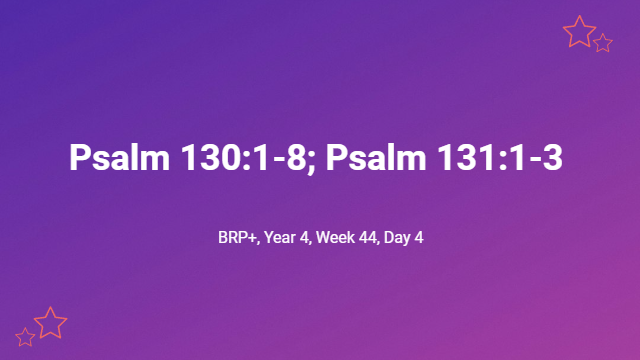Psalm 130:1-8; Psalm 131:1-3
Q.1. Why was the Psalmist desperate for God to answer his prayer? What was his belief about the nature of God? When can this Psalm bring us comfort? – (Ps.130:1-8)
It becomes clear as you read through the lyrics of this song that the Psalmist felt cut off from God because of his sins and failures. Therefore, this Psalm is special when our sins bring us low and diminish our confidence in our standing with God. What undergirded the Psalmist at such a time, was his belief about his God – 3 If You, Lord, should mark iniquities, O Lord, who could stand? 4 But there is forgiveness with You, that You may be feared (Ps.130:3-4). He acknowledged that he could never be worthy of God, and that he was always in His debt. However, he also knew that God is a kind and forgiving God – … with the Lord there is lovingkindness, and with Him is abundant redemption (Ps.130:7 c.f. Col.2:13). So great is God’s grace toward His penitent people, that the Psalmist took comfort in the fact – and He will redeem Israel from all his iniquities (Ps.130:8). Thus he waited with hope and confidence that God would respond to his earnest pleas.
Q.2. What is the lesson of the Psalmist’s approach to God? How did this impact his confidence in his relationship with God? – (Ps.131:1-3)
This Psalm beautifully pictures the intimacy that the Psalmist experienced with God – Surely, I have composed and quieted my soul; Like a weaned child rests against his mother, my soul is like a weaned child within me (Ps.131:2). However, there was a good reason why he was in such a comfortable place. He had a high view of God’s power and greatness … and a realistic view of his own humanity and limitations – O Lord, my heart is not proud, nor my eyes haughty; Nor do I involve myself in great matters, or in things too difficult for me (Ps.131:1). His approach to God was one of utter humility. He had also learned his proper place. He knew that there were clear limitations to his understanding of the things of God. Though it is true that God has placed in man’s heart a thirst for knowledge, it is important to remember that the most eminent scholars do not know even 0.01% of any science. While it is good to search things out, we must also accept that there are boundaries to man’s intelligence, compared with the knowledge of God – because the foolishness of God is wiser than man (1 Cor.1:25). This kept the Psalmist anchored to truth and reality. This too is the basis for keeping our hope and trust in God.

